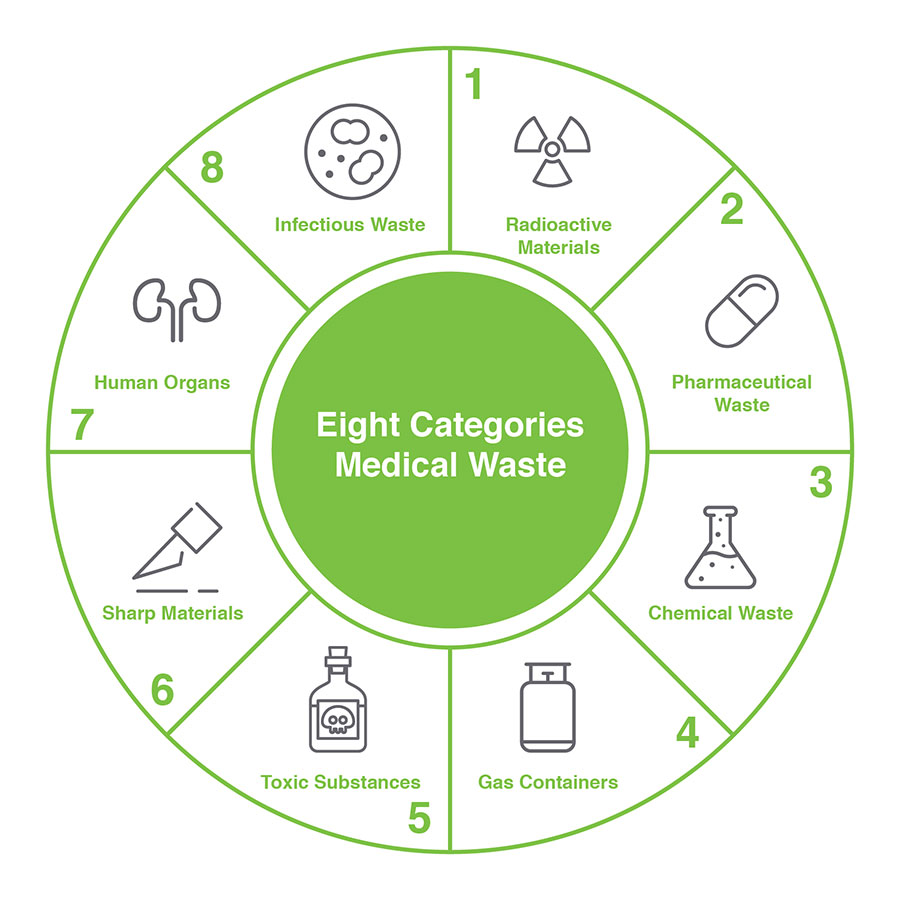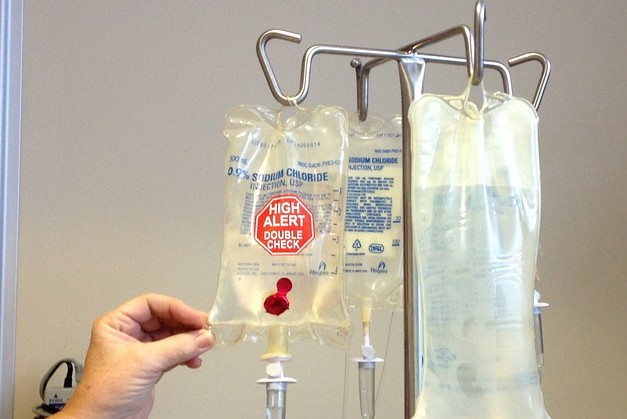Shielding Health And Wellness: Specialist Medical Waste Removal Services for a Tidy Environment
Shielding Health And Wellness: Specialist Medical Waste Removal Services for a Tidy Environment
Blog Article
Stay Compliant and Safe: How to Get Rid Of Medical Waste Properly
In today's ever-changing health care landscape, making certain compliance and safety when it comes to medical waste disposal is of utmost relevance. In this discussion, we will explore the different kinds of clinical waste, the affiliated risks, the legal requirements, and the finest methods for keeping a certified and secure clinical waste management system.
Significance of Appropriate Medical Waste Disposal
Appropriate medical garbage disposal is of utmost value in making certain the safety and security and health of both medical care employees and the public. Clinical waste, that includes things such as made use of needles, infected dressings, and ran out drugs, postures significant wellness threats otherwise managed and thrown away properly.

Furthermore, improper disposal of clinical waste can bring about ecological contamination. When clinical waste is not set apart, treated, or disposed of correctly, it can find its way right into land fills or bodies of water, possibly polluting the air, water, or dirt resources. This can have destructive results on environments and human health and wellness, as dangerous substances may seep right into the environment or be launched into the atmosphere.
Kinds Of Clinical Waste and Their Dangers
The diverse series of medical waste created by medical care facilities presents various risks that must be thoroughly addressed to ensure correct disposal and protect against potential injury to public health and wellness and the atmosphere. Clinical waste can be categorized into various classifications based on its features and level of threat.
One kind of medical waste is transmittable waste, that includes things that are polluted with blood or various other potentially transmittable materials. This can consist of utilized needles, syringes, and various other sharp items, along with tissues, swabs, and dressings from people with contagious conditions. Incorrect disposal of transmittable waste can cause the transmission of dangerous microorganisms and the spread of infections.
An additional classification is unsafe waste, that includes products that are toxic, combustible, corrosive, or reactive. This can consist of chemicals, drugs, and specific clinical tools. Mishandling or inappropriate disposal of contaminated materials can lead to ecological contamination and pose dangers to the wellness of waste workers and the general public.
Contaminated waste is an additional type of medical waste that have to be carefully handled. This waste consists of products that contain radioactive compounds, such as made use of radiation therapy sources or polluted lab products. Improper handling or disposal of radioactive waste can result in radiation exposure and severe wellness risks.
Lastly, non-hazardous general waste, such as paper, packaging materials, and food waste, is likewise produced by health care centers. While this waste might not posture significant risks, it still needs to be properly managed to preserve tidiness and prevent the tourist attraction of bugs.
To make sure the secure disposal of clinical waste, health care centers need to carry out appropriate segregation, storage, therapy, and transport approaches. This consists of utilizing suitable containers, labeling, and training for staff, as well as adhering to neighborhood laws and standards. By dealing with the dangers associated with different types of clinical waste, medical care centers can shield public health and the environment.
Lawful and Regulative Requirements for Disposal
In order to ensure the secure and proper disposal of medical waste, healthcare centers should adhere to legal and regulative needs. These requirements remain in place to protect public health and the atmosphere from the potential risks connected with medical waste. Medical waste is classified as an unique group of waste because of its possible to transmit infectious conditions and include hazardous substances.

Some typical requirements include the partition and appropriate packaging of medical waste, using authorized tags and containers, and the implementation of secure handling and transport treatments - medical waste removal services. Healthcare facilities may also be called for to preserve documents of their waste administration practices and offer paperwork to regulative authorities upon request
Failing to follow these lawful and regulative needs can cause charges, penalties, and reputational damage for health care centers. It is, therefore, important for medical care suppliers to prioritize conformity and establish robust waste administration protocols to make certain the proper and secure disposal of medical waste.
Finest Practices for Safe Medical Waste Administration
Healthcare facilities must stick to market ideal techniques to make certain the reliable and secure administration of medical waste - medical waste disposal services with WasteX. Executing these ideal techniques not just helps secure the Check Out Your URL setting and public health but also minimizes the risk of potential legal and monetary effects
One of the key finest techniques is the correct segregation and control of different types of clinical waste. This involves making use of color-coded containers and plainly identifying them to make sure that each sort of waste is taken care of properly. In addition, medical care centers should have designated locations for storage space and disposal of medical waste, with clear standards and treatments in position.
Another crucial aspect of safe clinical waste management is the training and education and learning of healthcare staff. All workers that deal with clinical waste must get detailed training on the correct handling, storage, and disposal procedures. It is essential to guarantee that employee are conscious of the prospective dangers connected with medical waste and are geared up with the necessary expertise and skills to handle it safely.
Normal surveillance and bookkeeping of waste monitoring practices is likewise vital. This entails regularly reviewing waste administration procedures, performing inspections, and keeping precise documents. By monitoring waste monitoring methods, health care centers can identify any kind of possible issues or areas for improvement and take corrective actions as necessary.
Finally, healthcare centers should prioritize the use of eco pleasant disposal methods whenever feasible. This consists of making use of waste therapy technologies such as autoclaving or incineration, which can help in reducing the link volume and harmful nature of medical waste.
Eco-Friendly Solutions for Medical Garbage Disposal
Applying green services for medical waste disposal is critical for medical care centers to decrease environmental influence and make certain lasting techniques. Typical methods of medical garbage disposal, such as incineration and landfilling, have actually been found to release harmful toxins into the air and infect dirt and water resources. Therefore, there is a growing requirement for alternate methods that are both secure and eco-friendly.
One environmentally friendly option is the application of on-site waste therapy systems. These systems utilize advanced modern technologies to securely process medical waste within the health care center itself. By dealing with the waste on-site, transport exhausts and dangers connected with off-site disposal are decreased. Additionally, these systems typically utilize innovative sterilization techniques, such as heavy steam or microwave treatment, to make sure the complete destruction of infectious organisms.
Another environmentally friendly strategy is the adoption of recycling programs for sure kinds of clinical waste. Materials such as glass, plastics, and steels can be reused as opposed to disposed of in garbage dumps. By applying segregation and recycling programs, medical care facilities can substantially minimize their waste quantity and lessen medical waste disposal services with WasteX their ecological footprint.
Additionally, medical care facilities can explore the usage of reusable medical devices and materials. By opting for multiple-use things, rather than single-use choices, the amount of waste created is significantly decreased. Recyclable things can be disinfected and made use of several times, causing price savings and much less environmental impact.
Conclusion
Finally, proper disposal of medical waste is important for preserving conformity and ensuring security. Understanding the types of medical waste and their linked threats is very important in order to execute the ideal disposal approaches. Sticking to legal and regulative needs is necessary for preventing charges and shielding the environment. Complying with best methods for secure medical waste management and discovering environment-friendly options can add to a lasting and liable approach to garbage disposal in the medical care market.
In this conversation, we will discover the numerous kinds of clinical waste, the connected threats, the lawful demands, and the ideal techniques for keeping a certified and risk-free clinical waste monitoring system - medical waste removal.One type of medical waste is contagious waste, which consists of products that are contaminated with blood or various other possibly transmittable products.Radioactive waste is an additional kind of clinical waste that have to be thoroughly handled. Clinical waste is classified as an unique category of waste due to its possible to transfer contagious diseases and have damaging compounds
Complying with best techniques for secure clinical waste monitoring and discovering environmentally friendly options can add to a sustainable and liable approach to lose disposal in the healthcare sector. medical waste disposal services with WasteX.
Report this page